- Home
- John Scalzi
The God Engines Page 2
The God Engines Read online
Page 2
“But a dog neither knows nor cares if you describe it as ‘unclean,’ Priest Andso,” Forn said. “Nor do we bid a dog to bring the Righteous through space or hold the ship and its crew safe from harm.”
“If you have a point, Parishioner Forn, I regret to say that it escapes me at the moment,” Andso said, swirling his wine.
“My point, Priest Andso, is that this ship has a god for an engine,” Forn said. “A god who is angry and spiteful, and who will with opportunity do any of us harm, as your acolyte so recently learned. I am a good and faithful servant to Our Lord, as all here know, and hold no task higher than to bend to His command. Yet I am practical. Practicality teaches me that if one wishes one’s engine to run well, one does not throw sand into its workings. Or in this case give it additional cause to hate us.”
Andso took a long drink to finish his wine, and then motioned to a standing acolyte to refill his cup. “It will hate us regardless, because that is all it knows, and all it would know. And as you are a good and faithful servant of Our Lord, Parishioner Forn, of which I have no doubt,” Andso uttered the last of these words with a unmistakable curl of his lip, “then you also know from the commentaries that Our Lord requires us to not only adore and honor him in the fullest measure, but to chastise and pity those whom He has brought low. ‘They are the defiled, without measure of redemption, and faithful declaim their rank.’ ” He raised his cup to his lips once more.
“I admire your scrupulous adherence to the commentaries, Priest Andso,” Forn said. “I wonder if you have a similar fervor for the portion of the commentaries which read ‘He that has drink for a pillar finds it falls when he does lean upon it.’ ”
Andso paused in the motion of a swallowing and in doing so choked himself, spraying a little of his wine onto the table. An acolyte rushed to the priest with a kerchief; Andso snatched it, daubed his lips and chin, and flung it back at his acolyte. He turned to the captain. “You offer your first mate much freedom, Captain Tephe.”
“I would think you would be gratified that he is so learned in the commentaries, Priest Andso,” Tephe said, and then raised his hand quickly as the priest’s face began to mottle. “Nevertheless I agree that this line of conversation has gone as far as it is to go. I am better interested in your first statement, when you said that the gods are getting restless. Perhaps you might speak more on this.”
Andso stared for a moment, considering his next action. Tephe watched him, impassively. He had learned that given enough time, the priest would do the minimally acceptable thing; it was only when he was rushed that his arrogance overtook him.
Finally Andso forced himself to relax. “Very well, captain. After our incident today with the Defiled”—Andso shot Forn a glance—“I used the Gavril to talk to several priests on other ships.”
“You engaged the Gavril without my permission?” Tephe said, straightening. It would explain why Lieutenant Ysta was absent from the captain’s table this evening. Gavrils were given the Talent to speak to each other no matter how distant, and thus one was stationed on each ship of the fleet. Nevertheless, every God-given Talent took its toll with use, and it was wearying for any man to reach across space and find another single mind. If Andso had used the Gavril to contact several ships in rapid succession, Ysta might need a day to recover.
Andso looked back at the captain, mildly. “It was ecclesiastical business, Captain,” said the priest. “And as you know, for such matters I may use may own discretion when using ship resources.”
“You might have informed me as a courtesy,” Tephe said. “The Righteous is without its Gavril now.”
“Parishioner Ysta was fine when I left him,” Andso said. He had returned to drinking. Tephe chose not to say anything further but glanced over to Forn, who nodded and motioned over one of the servers. He would have someone visit Ysta. “And in any event I learned what I needed to know, which is that our ‘engine,’ as your first mate describes it, is not the only one which has been refusing orders of late. On three other ships, the gods have also resisted or have had to be disciplined. This has all been since Celebration of the Immanence.”
“Four instances in ten days,” Forn said, returning to the conversation. “That does seem an unusual amount.”
“When you consider that in the entire year previous there were but three such rebellions, it is most unusual,” Andso said.
“Is there cause?” Tephe said.
“Of course not,” Andso said. “Aside from these Defiled testing their boundaries, as does any trapped predator. They would wish to assert to us that they are yet terrible creatures, instead of the slaves of a greater god. They howl to the stars, Captain.” Andso punctuated the comment with a heavy swallow of wine, and then pointed at Forn, unsteadily. “And this is why we must be constant in our reminders to them of their status, Parishioner Forn. Words. They have power. To name a god is to give it power. To deny it such is to take it. Only a little but even so. To celebrate Our Lord in its presence weakens it, and when we call this thing Defiled we lower it and raise Our Lord, because He is the one who enslaved it. You know, Parishioner Forn, what keeps the Defiled bound in that circle.”
“I assume it is the iron in its chains,” Forn said.
“It is faith, Parishioner Forn!” Andso said, too loudly. “Iron is but a simple metal. What gives it its quality to hold and wound and kill is our own faith in Our Lord. This is why I am here. To tend to your faith, each of you. And if every officer on this ship were as you, Parishioner Forn, the Defiled would have long ago slipped its bonds.” Andso waved at Captain Tephe. “And then not even our captain’s precious Talent of command would avail him of…”
“Enough,” Tephe said, suddenly and severely. “Priest, you are drunk. I suggest you retire.”
“I was already weary, Captain,” Andso said, and pushed back his chair. An acolyte unobtrusively positioned himself to take the priest’s unsteady arm; Andso angrily waved him away and looked around the table. “I will tell you something, all of you,” he said. “A priest has no Talent—no thing of Our Lord to hang on his chest, to give him a Power. Do you know why? Because a priest is of Our Lord! His own hand, His own arm, His own tongue. I have faith, my parishioners. I am faith in Our Lord embodied. Faith, gentlemen. Without it we are lost.” Andso glared directly at Forn. “I will see you on the morrow, Parishioner Forn. We will discuss your faith.”
“Yes, Priest,” Forn said. Andso weaved out of the captain’s mess, trailing acolytes and the muttering of the table.
Tephe leaned toward his first mate. “I believe that your faith is strong, Neal,” he said, quietly.
“Amen, so it is, Captain,” Forn said. “Strong enough to survive this priest.”
“He was a better priest, once, or so I have heard tell,” Tephe said.
“I imagine this was before he made provision to travel with his own stock of wine,” Forn said.
“I believe he makes such provision because he is aware how much better he once was,” Tephe said.
“So,” Forn said, and then shook his head, lightly. “I do not doubt his faith any more than my own, Captain,” he said. “And I know he is the presence of Our Lord on the Righteous. I do wish Our Lord had seen fit to be present in a worthier vessel. If the priest is right that it is our faith and not iron that truly binds the god, then we sorely need our faith.”
Tephe looked at his first mate with the very lightest of reproach. “Our failure at Ament Cour should not decrease our faith, Neal,” he said.
“Neither yours nor mine, Captain,” Forn agreed. “But our defeat weighs heavily on the crew, as does this rebellion by our god.” Forn leaned in closer to the Captain. “And more than that they hear rumors of other late defeats and failures in the fleet, and that Our Lord is newly set upon by other gods. Priest Andso’s foolish comment here at this table that other gods were restless will also find their way to the crew. Captain, the crew is unused to failure and defeat. Their faith is now put to the test.”
&
nbsp; Tephe sat back and considered his second in command. “I understand now why you deflected the priest into a pointless conversation about terminology,” he said, to Forn. “And I acknowledge to my regret it is I who brought him back to it. My apologies, Neal.”
Forn smiled. “He would have come round to it again on his own behalf. I but delayed him a moment at best.” He became serious again. “My point, Captain, is that if there were a time where faith were needed to grow, this is that moment. Priest Andso is the man to whom such task is given. That drunken, petty, stupid man. I fear for it.”
Chapter Three
The portal to the Rookery opened and it was Shalle Thew, form bare beneath embroidered robe, who opened it.
This gave Captain Tephe a start. “You do not often answer the Rookery door,” he said, after a moment.
“Yes, well,” Shalle said. “Lade is having a meal, Cien is resting, Issa is ministering, and Tasy received a special dispensation to go to the Healer’s Bay to tend that poor boy the god chewed upon. There was no one else to answer the door. And so here I am.”
“I would speak to you if you have a moment,” Tephe said.
“You are the captain,” Shalle said, lightly, and brushed back a wisp of hair. “I always have time for you. It’s one of the benefits of the job. Both yours and mine. Now, come in, captain, and be welcome.” Shalle stood aside, head bowed slightly, lips curved in a small smile.
The captain entered the Rookery. Shalle closed the portal and secured it. “We’ll go to my nest. I’ll let Lade know we’re not to be disturbed. Go on, captain. I’ll be right behind you.” Shalle gave the captain a smile and disappeared into the Rookery’s small mess area.
Shalle’s “nest” was no more than the same cramped quarters any senior officer or priest would merit, save that where an officer’s quarters were Spartan, and a priest’s monastic, a rook’s quarters were soft-edged, warm and inviting. Shalle’s nest was filled with the colors of russet, purple and weathered gold, and the scent of fragrant and mellow woods. Tephe breathed it in as he always did and relaxed in spite of himself.
There was something new on Shalle’s small vanity shelf. Tephe picked it up and examined it. It was a figurine of an animal he didn’t recognize.
“It’s a rook,” Shalle said, entering the nest and securing the door. “A real one.”
“Is it,” Tephe said.
“A representation of one, anyway,” Shalle said, and came up the captain, putting a gentle hand on his shoulder, and reaching with the other to lightly hold the hand in which the figurine rested. “It was a gift from Bran Usse, who found it on Ines and thought I would like it.”
“A kind gift,” the captain said. “And not what I would have expected from Quartermaster Usse.”
“How do you mean,” Shalle said, running fingers lightly across the captain’s own.
“The Quartermaster was a severe man,” the captain said.
Shalle gave a small laugh. “Not with me, my captain.”
“So he was a man of two faces,” Tephe said.
“No,” Shalle said, with a tone that was both patient and gently mocking. “He had just the one. But we are all different to different people, aren’t we? I know you’re not the same with me as you are to your crew. It doesn’t mean you have two faces.”
“You are the same,” Tephe said. “With everyone.”
This earned the captain a quick but unhurried kiss on the cheek. “I’m glad you think so. I work hard to make it seem that way,” Shalle said, and then slipped fingers around to take the figurine from the captain’s hand. “Usse said that the shopkeep who sold this to him told him that in ancient times rooks were thought to guide souls after death.”
“What did you think of that?” Tephe asked.
“It made me sad,” Shalle said, gazing at the figurine. “Especially after Bran died so badly. I thought of a rook just waiting for him, sitting there watching him go.” Shalle shuddered and set down the figurine. “I prefer how we think of rooks today. Not guides of the souls of the dead, but comforters of souls of the living.”
“Their souls?” Tephe said, and now it was his turn to have a lightly mocking tone. Shalle grinned at this and pushed the captain to the bed; the captain allowed himself to be pushed.
“Yes, my captain, their souls,” Shalle said, pressing into the captain. “How is your soul at the moment?”
Tephe reached over and drew Shalle into a long and welcome kiss. “I do confess it is better than it was,” he said, when he had parted from the kiss.
Shalle lingered, eyes closed, smile on lightly parted lips, then moved away. “But not as good as it could be.”
“You can tell that from a kiss,” Tephe said.
“I can tell that from you,” Shalle said.
Tephe smiled at this. “That quality of knowing is why I am here,” he said. “Your rooks tend to the crew.”
“Yes,” Shalle said.
“And you to the officers,” Tephe said.
Shalle smiled. “I think you’re well aware of what my job is, and who is under my care, my captain. I see all the officers, and would see Priest Andso, if he’d ever step inside the rookery, and he’d rather set himself on fire than do that.”
“How is their faith?” Tephe asked.
Shalle looked at the captain quizzically for a moment, then changed expression. “Clever of you to ask me that question.”
“It is not my intent to be clever,” Tephe said.
“No,” Shalle agreed. “I know why you’re asking. The attack at Ament Cour. The number of battles the Righteous has engaged in this tour. This attack by the god. The stories of other gods resisting.”
Tephe was surprised. “The rumors are out already?” he said.
“Not rumors,” Shalle said. “The Priest Andso was not subtle about using Lieutenant Ysta. It’s all over the Righteous by this point.”
“Stupid man,” Tephe muttered.
“That’s blasphemy,” Shalle said, lightly.
“I did not say ‘stupid priest,’ ” Tephe said. “I said ‘stupid man.’ ”
“That’s the sort of cleverness you say you don’t intend,” Shalle said.
“Neal—Commander Forn—says that the faith of the men has diminished of late due to these events,” Tephe said, returning to the subject. “Do you see it? Do the other rooks?”
“We haven’t been looking for it,” Shalle said. “The crew comes here to have their release and to have their moment of joy, but you know that is not all we do. We comfort in other ways. By hearing and listening and allowing them to be the things they can’t be when they are on duty or with their crewmates.”
“And?” Tephe said.
“Now that you’ve brought it to my attention, many of those I and my rooks have tended to this tour want something else besides release,” Shalle said. “They want that too, of course. But they also want to talk. They want to be held or touched without arousal.” A wave to the rook figurine. “They give us little things and trinkets.”
“They’re worried,” Tephe said.
“More than worried, I think,” Shalle said. “Ean, you and I have been on three tours of duty together, here and on the Holy, and before that the both of us had other tours. Doesn’t this tour feel different to you?”
“We have been given defeats we have not had before,” Tephe said. “This would naturally give rise to doubts.”
“I don’t know,” Shalle said. “The crew may have doubts because they are dealing with defeat. But it may also be that because we have doubt, we have been defeated.”
“I am not sure of that,” Tephe said.
“Neither am I,” Shalle said. “But I get the feeling that there is something deeper at work here, Ean. It’s been present since the start of the tour but I haven’t had words for it until now. I needed you to bring it directly into my attention.”
“And this relates to the crew’s faith, you think,” Tephe said.
“It might,” Shalle said. “The m
en know what they know. They feel what they feel. In their souls, in the places where Our Lord moves through them, they sense what Our Lord senses. Our Lord is being challenged now by other gods in a way He has not been for centuries. If we sense in ourselves what Our Lord senses, then maybe we’re all sensing something new.”
“What is that?” Tephe asked.
“Fear,” said Shalle.
“Now, that is blasphemy,” Tephe said, after a long moment.
Shalle smiled. “A rook lives to comfort the faithful, or so the commentaries say. If speaking these words give you comfort, then Our Lord might forgive me.”
“Of all the things these particular words of yours bring me, comfort is not one of them,” Tephe said.
Shalle rose from the chair and let the robe ties slip, exposing smooth skin beneath, and leaned again toward the captain. “I don’t believe that,” Shalle said. “You are a captain. And you are you. When something affects your crew, you don’t rest until you know what it is. Until you understand what it is. And so I speak understanding to you. If the words don’t comfort you, the knowing does. And that’s good enough for me.”
Shalle hovered over Tephe now, robe open, leaning, slender sliver chain holding an iron Talent, hovering between small and perfect nipples. Tephe longed to take one in his mouth, and did. Shalle groaned and placed a hand behind the captain’s head, pressing him into the nipple, which he began lightly to bite.
Tephe had longed for Shalle since they first met on the Holy, where Tephe had served as first mate. He was drawn first by words, carried by Shalle’s warm and quiet voice, which rejected the careful distance and protocol of the High Speech favored by the Bishopry Militant, the cant which a young Tephe had struggled so hard to master and could not bring himself to leave off. Words slid, informal and inviting, from Shalle’s mouth to Tephe’s ear. Shalle’s other qualities made them apparent soon after; not the physical—another rook was assigned to the officers—but the apprehension and intelligence and practical knowledge of a ship and its crew. When Tephe was offered the command of the Righteous, he requested Shalle to lead its rookery.

 Lock In
Lock In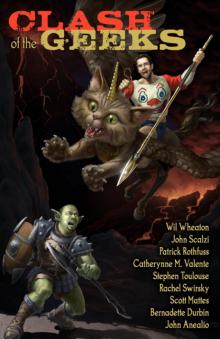 Clash of the Geeks
Clash of the Geeks Head On
Head On The Dog King
The Dog King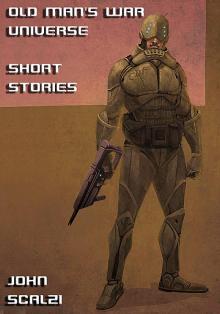 Old Man's War Universe: Short Stories
Old Man's War Universe: Short Stories The End of All Things
The End of All Things Tales From the Clarke
Tales From the Clarke The Human Division
The Human Division The Android's Dream
The Android's Dream An Election
An Election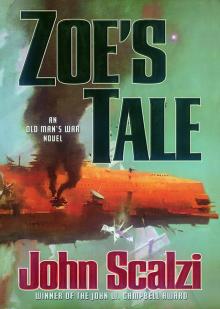 Zoe's Tale
Zoe's Tale Agent to the Stars
Agent to the Stars This Hollow Union
This Hollow Union The Gentle Art of Cracking Heads
The Gentle Art of Cracking Heads Old Man's War
Old Man's War The Tale of the Wicked
The Tale of the Wicked Your Hate Mail Will Be Graded: A Decade of Whatever, 1998-2008
Your Hate Mail Will Be Graded: A Decade of Whatever, 1998-2008 Judge Sn Goes Golfing
Judge Sn Goes Golfing The Back Channel
The Back Channel The Human Division 0.5 - After the Coup
The Human Division 0.5 - After the Coup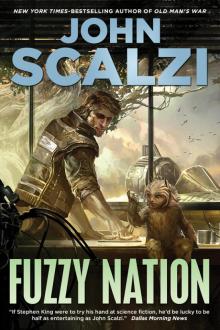 Fuzzy Nation
Fuzzy Nation The Observers
The Observers This Must Be the Place
This Must Be the Place The Last Colony
The Last Colony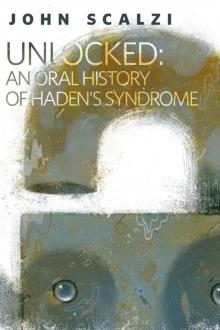 Unlocked: An Oral History of Haden's Syndrome
Unlocked: An Oral History of Haden's Syndrome A Voice in the Wilderness
A Voice in the Wilderness Redshirts
Redshirts The Collapsing Empire
The Collapsing Empire The Last Emperox
The Last Emperox The God Engines
The God Engines A Problem of Proportion
A Problem of Proportion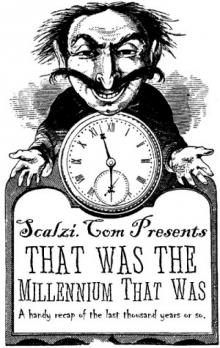 THAT WAS THE MILLENIUM THAT WAS
THAT WAS THE MILLENIUM THAT WAS The B-Team
The B-Team The Sound of Rebellion
The Sound of Rebellion The President's Brain Is Missing
The President's Brain Is Missing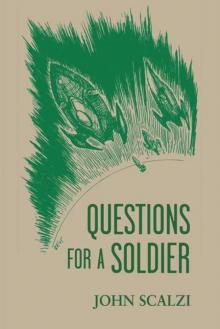 Questions for a Soldier
Questions for a Soldier Walk the Plank
Walk the Plank We Only Need the Heads
We Only Need the Heads How I Proposed to My Wife: An Alien Sex Story
How I Proposed to My Wife: An Alien Sex Story Earth Below, Sky Above
Earth Below, Sky Above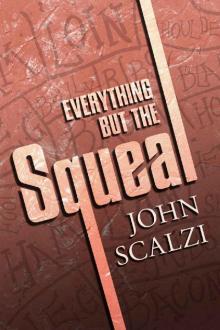 Everything but the Squeal
Everything but the Squeal Old Man’s War
Old Man’s War The Human Division #12: The Gentle Art of Cracking Heads
The Human Division #12: The Gentle Art of Cracking Heads This Must Be the Place thd-10
This Must Be the Place thd-10 A Voice in the Wilderness thd-4
A Voice in the Wilderness thd-4 The Observers thd-9
The Observers thd-9 The End of All Things: The Fourth Instalment
The End of All Things: The Fourth Instalment Earth Below, Sky Above thd-13
Earth Below, Sky Above thd-13 Zoe`s Tale вбиос-4
Zoe`s Tale вбиос-4 After the Coup
After the Coup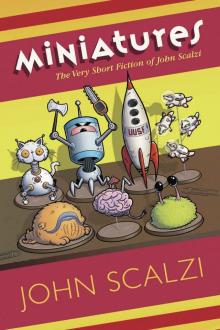 Miniatures: The Very Short Fiction of John Scalzi
Miniatures: The Very Short Fiction of John Scalzi The Last Colony вбиос-3
The Last Colony вбиос-3 Tales From the Clarke thd-5
Tales From the Clarke thd-5 Old Man's War omw-1
Old Man's War omw-1 The Human Division #8: The Sound of Rebellion
The Human Division #8: The Sound of Rebellion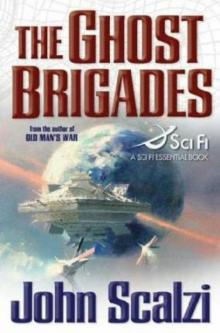 The Ghost Brigades omw-2
The Ghost Brigades omw-2 The Sagan Diary (old man's war)
The Sagan Diary (old man's war) The Sound of Rebellion thd-8
The Sound of Rebellion thd-8 The Human Division 13 - Earth Below, Sky Above
The Human Division 13 - Earth Below, Sky Above Head On_A Novel of the Near Future
Head On_A Novel of the Near Future The End of All Things: The First Instalment
The End of All Things: The First Instalment The B-Team thd-1
The B-Team thd-1 The Back Channel thd-6
The Back Channel thd-6 Walk the Plank thd-2
Walk the Plank thd-2 The Human Division #9: The Observers
The Human Division #9: The Observers The End of All Things: The Third Instalment
The End of All Things: The Third Instalment The Human Division #10: This Must Be the Place
The Human Division #10: This Must Be the Place The End of All Things #2: This Hollow Union
The End of All Things #2: This Hollow Union We Only Need the Heads thd-3
We Only Need the Heads thd-3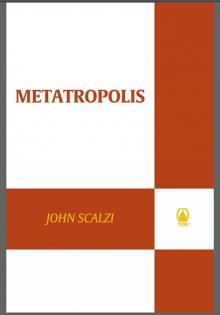 Metatropolis
Metatropolis The Dog King thd-7
The Dog King thd-7 The Consuming Fire (The Interdependency)
The Consuming Fire (The Interdependency)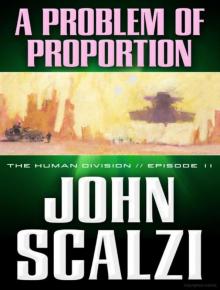 The Human Division #11: A Problem of Proportion
The Human Division #11: A Problem of Proportion